Governance of the Academy
Executive
The Executive and Council guide the Academy’s work, contributing to strategic leadership decisions, electing Fellows, and helping determine priorities and goals. The Executive team forms part of the Council and is the Academy’s decision-making body.
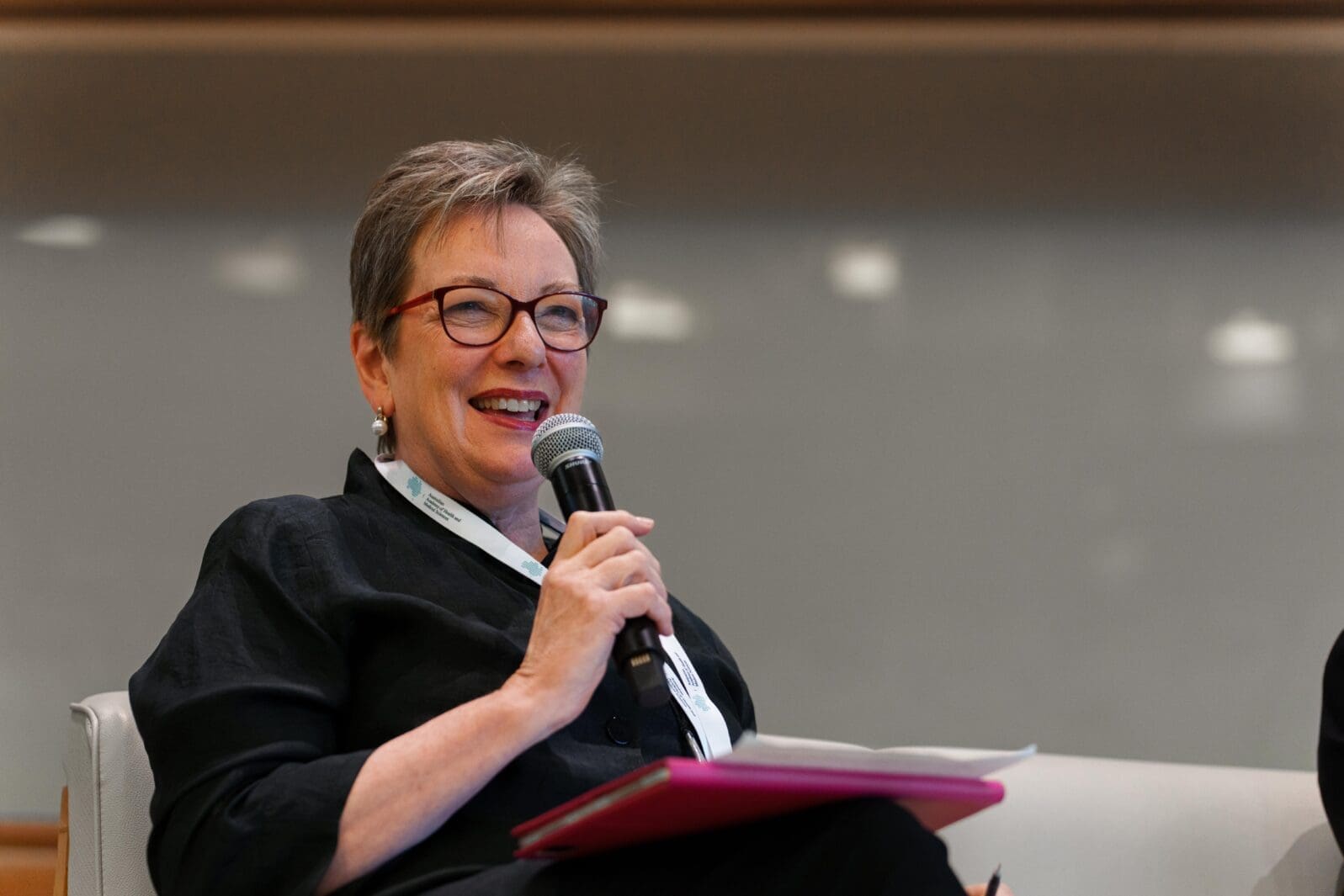
Council
The Council, which includes Fellows from across Australia, advises the Executive. The Fellowship elects Council members to represent their interests.
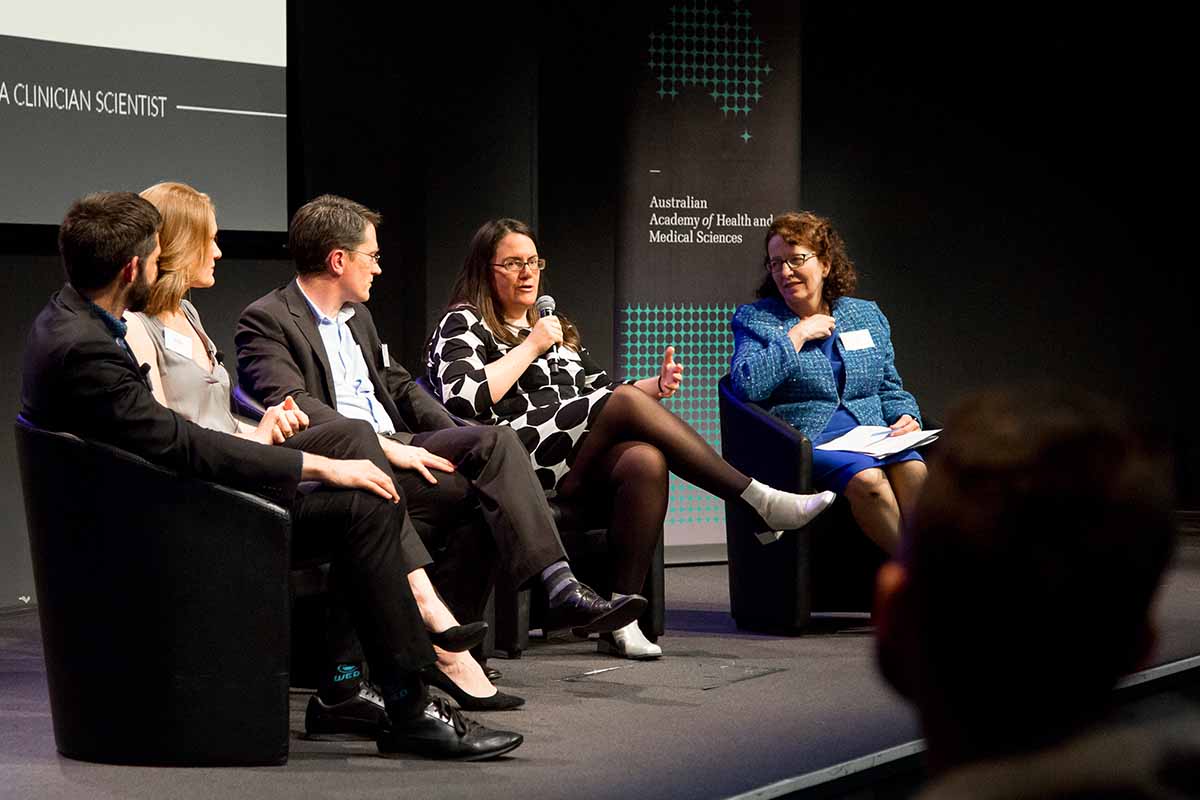
Executive council members
President
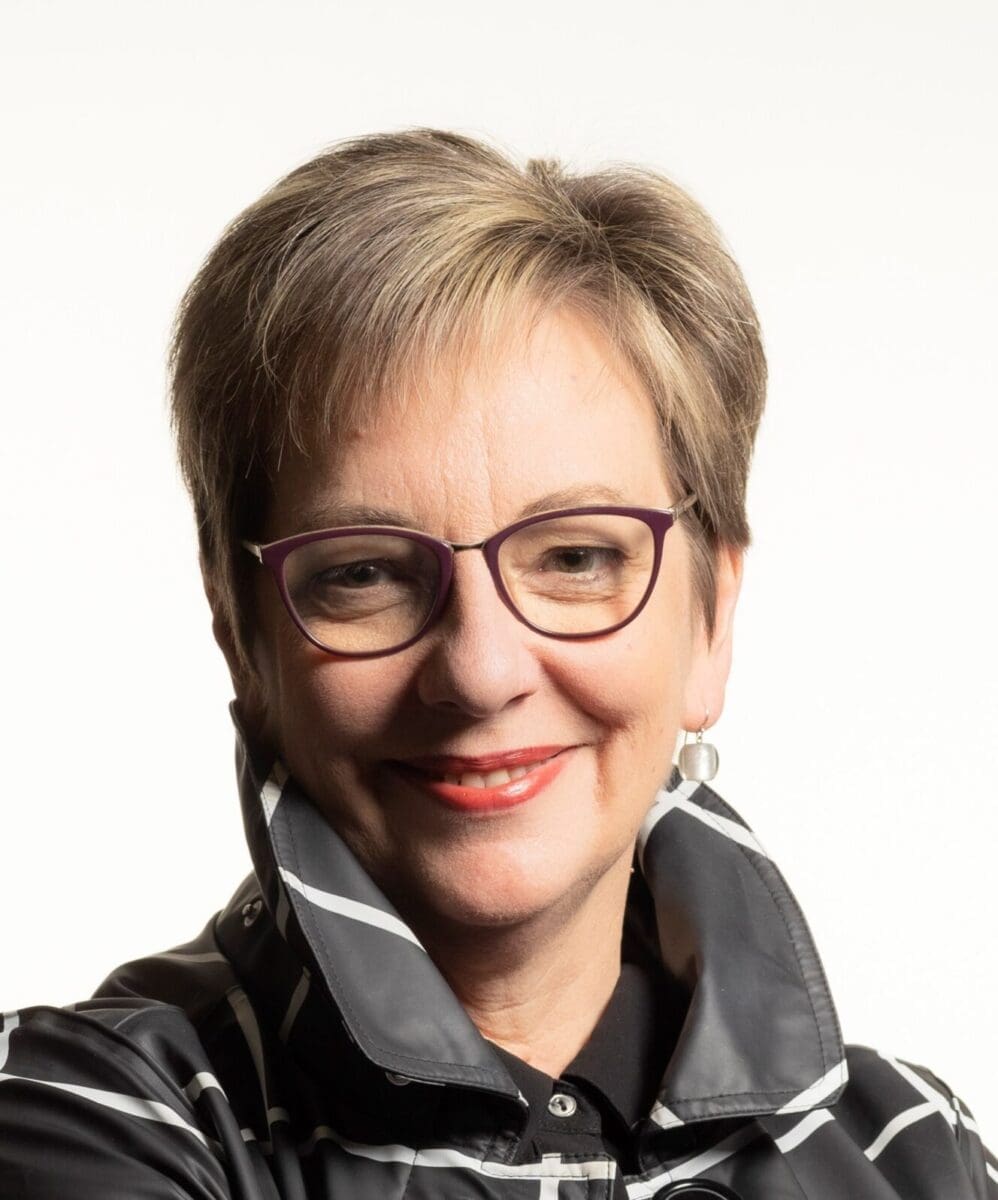
Professor Louise Baur AM FAHMS
The University of Sydney, The Children's Hospital at Westmead
Professor Louise Baur graduated in medicine from The University of Sydney in 1981 and subsequently trained in general paediatrics in Sydney and London. She was awarded a PhD in the area of paediatric nutrition from The University of Sydney in 1993. Louise is Professor of Child & Adolescent Health at The University of Sydney, and a consultant paediatrician in Weight Management Services at The Children’s Hospital at Westmead in Sydney. Louise is also a member of the Prevention Research Collaboration based at the University of Sydney. The latter group undertakes a range of policy-relevant research in the areas of obesity, nutrition and physical activity.
Professor Baur’s research interests include the prevention of childhood obesity, the antecedents of obesity and the metabolic syndrome in childhood, the complications of paediatric obesity and the effective management of obesity and related disorders in a variety of clinical settings.
Professor Baur is on the Editorial Board of Pediatric Obesity (and was its Founding Editor-in-Chief from 2005-2010). She has a range of roles with the World Obesity Federation, including President 2022-2024, and has previously served on the Board of World Vision Australia and Sydney Children’s Hospitals Network Governing Board.
In 2010, Professor Baur was made a Member of the Order of Australia (AM) “for service to medicine, particularly in the field of paediatric obesity as a researcher and academic, and to the community through support for a range of children’s charities”.
Immediate Past President
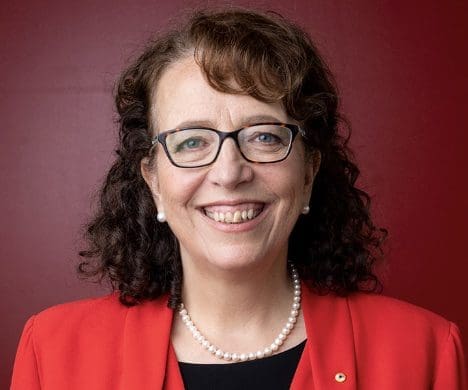
Professor Ingrid Scheffer AO FRS FAA FAHMS
The University of Melbourne, Florey Institute of Neuroscience and Mental Health
Professor Ingrid Scheffer is a physician-scientist whose work as a paediatric neurologist and epileptologist at the University of Melbourne and Florey Institute has led the field of epilepsy genetics over more than 20 years, in collaboration with Professor Samuel Berkovic and molecular geneticists. This resulted in identification of the first epilepsy gene and many more genes subsequently. Professor Scheffer has described many novel epilepsy syndromes and performed genotype–phenotype correlation. She recently played a key role in the first major reclassification of the epilepsies in two decades as Chair of the International League Against Epilepsy Commission for Classification and Terminology.
She obtained her medical degree from Monash University and her PhD from the University of Melbourne for which she received the Chancellor’s Award. She trained in paediatrics at the Royal Children’s Hospital in Melbourne, paediatric neurology at The Great Ormond Street Hospital for Sick Children, London UK, and epileptology at the Austin Hospital. In her PhD on the genetics of the epilepsies, she described four novel epilepsy syndromes which served as the basis for gene discovery.
She has received many awards: 2007 American Epilepsy Society Clinical Research Recognition Award, 2009 RACP Eric Susman Prize, 2013 GSK Award for Research Excellence, ILAE Ambassador for Epilepsy Award, 2013 Australian Neuroscience Medallion, 2013 Emil Becker Prize for child neurology and the L’Oréal-UNESCO Women in Science Laureate for the Asia-Pacific region for 2012. In 2014, she was elected as a Fellow of the Australian Academy of Sciences. She was awarded the Order of Australia in 2014 for “distinguished service to medicine in the field of paediatric neurology as a clinician, academic and mentor, and for research into the identification of epilepsy syndromes and genes.” Together with Professor Sam Berkovic, she was awarded the 2014 Prime Minister’s Prize for Science.
Vice-President
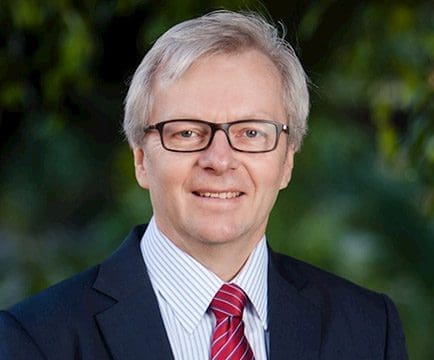
Professor John Prins FAHMS
Australian Health Research Alliance Chair
Professor John Prins is an active clinician-scientist, a respected thought leader in diabetes and endocrinology in Australia, and has wide experience on grant review and advisory committees for NHMRC, non-government organisations and industry.
As Health Translation Queensland’s Executive Director, Professor Prins is passionate about supporting collaborative translational research in Queensland. He is responsible for the strategic direction and vision of Health Translation Queensland and for improving communication, collaboration, and efficiencies across the broader Queensland health and medical research sectors, from discovery science right through to patient care across the state.
Professor Prins undertook his clinical training in endocrinology in Brisbane and then completed a PhD in adipose tissue biology at The University of Queensland. He completed his postdoctoral training at the University of Cambridge and was awarded a Wellcome Senior Research Fellowship in Medical Sciences in 1998.
Professor Prins has significant corporate leadership experience across the academic, health and pharmaceutical sectors, including as Head of Melbourne Medical School, University of Melbourne; Director, Metro South Hospital and Health Service Board; CEO of the Mater Group and Director of the Mater Research Institute-UQ. He was instrumental in the formation of spin-out biotechnology companies Adipogen Pty Ltd (merged to form Verva Pharmaceuticals in 2015) and Jetra Therapeutics. Professor Prins is an active clinician, currently providing endocrinology services at Mt Isa Hospital.
He has received more than $35 million in research and commercialisation funding, has published over 160 research publications with over 14,700 citations, and holds 4 international patents.
In July 2023, he was appointed Chair of the Australian Health Research Alliance (AHRA) – the national voice of 14 Research Translation Centres, which are either fully accredited or recognised as emerging by the National Health and Medical Research Council.
Treasurer and Public Officer

Professor Cheryl Jones FAHMS
Dean and Head of School, Sydney Medical School
Other Directors

Professor Bronwyn Kingwell FAHMS
CSL Limited
Professor Bronwyn Kingwell is the Senior Director, Research Therapeutic Area Lead in Cardiovascular and Metabolic Diseases at CSL Limited. She is also a graduate and fellow of the Australian Institute of Company Directors. Professor Kingwell’s fundamental and clinical research in arterial biomechanics has elucidated genetic, hormonal and environmental (exercise, diet) mechanisms contributing to large artery stiffening as well as opportunities for therapeutic modulation. With her collaborators she has contributed to our understanding of coronary plaque rupture, one main mechanism responsible for myocardial infarction, and has identified lipidomic biomarkers which through a licensing agreement with Zora Biosciences are currently available as a clinical test at the Mayo clinic. She has pioneered the transition of detailed cellular and molecular studies of high-density lipoprotein (HDL) in laboratory models, in particular with regard to glucose metabolism, to a human context. This work has opened new avenues in HDL therapeutics. Her contributions have also extended to studies influencing national and international physical activity guidelines. Professor Kingwell is a current member of the NMHRC Research Committee, the National Committee for Medicine and Public Health (Australian Academy of Science) and the Victorian Government SMaRT panel.
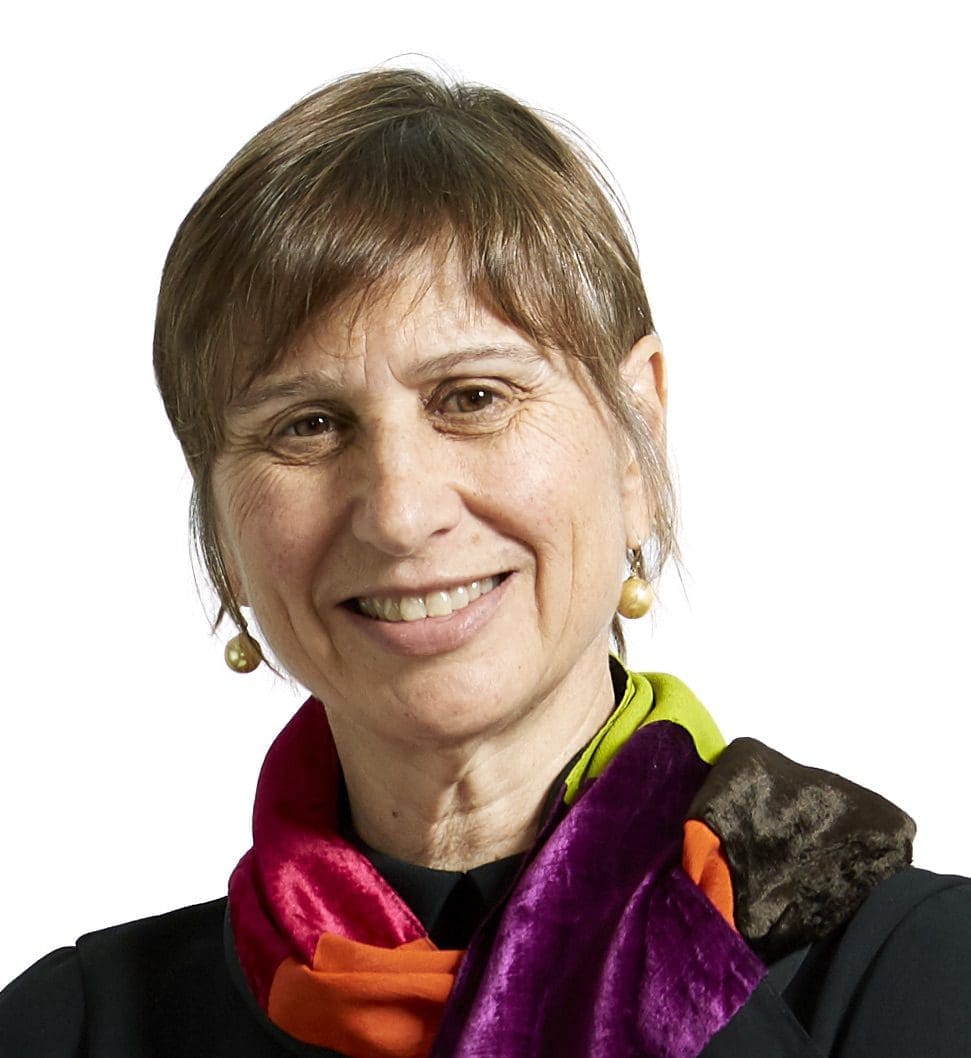
Professor Susan Davis AO FAHMS
Head, Women's Health Research Program, Monash University
Professor Susan Davis is Head, Monash University Women’s Health Research Program, Head of the Women’s Endocrine Clinic Alfred Hospital Melbourne and consultant Endocrinologist Cabrini Medical Centre. She is Leadership 3, NHMRC Investigator.
Her research (over 450 research publications) spans basic science to clinical trials and has been pivotal in the understanding of sex hormones in women across the life span in multiple non-reproductive target tissues including the brain (cognition, mood, sexual function), cardiovascular system (lipids, vascular function and coagulation) and other tissues (fat, muscle, joint cartilage and bone).
Professor Davis was one of five founders of Jean Hailes for Women, one of Australia’s leading women’s health organizations. She is a past President of the International Menopause Society and a past President of the Australasian Menopause Society. She has received numerous prestigious research awards, most recently the Elizabeth Blackburn Award of the NHMRC (2023), Ross Hohnen Award of the Australian Heart Foundation (2022), and the Medal of the Royal Australasian College of Physicians for her outstanding contribution and leadership in endocrinology and women’s health (2022). She was appointed an Officer of the Order of Australia for distinguished service to medicine, to women’s health as a clinical endocrinologist and researcher, and to medical education. In 2022 she was awarded.
She is an Advisor to the National Women’s Health Council Australia, Advisor to the NHS Menopause Improvement Programme Steering Committee (UK) and was an Advisor for the Australian National Women’s Health Strategy 2020-2030. She advocates for best clinical care via co-authorship of international Best Practice Guidelines and working with industry to ensure the health needs of women are understood. She has spoken before national and international regulatory bodies as an advocate and advisor.
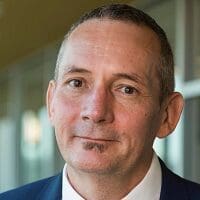
Professor Paul Scuffham FAHMS
Menzies Health Institute Queensland, Griffith University
Professor Paul Scuffham is a Professor in Health Economics, Director of the Menzies Health Institute Queensland, and Director of the Centre for Applied Health Economics at Griffith University. His research entails modelling the costs and benefits of health care interventions, the valuation of health outcomes and preferences for healthcare, and priority setting – all to enhance decision-making leading to better health for the nation. His research has influenced policy on matters such as the pricing of biologics and statins (amongst other drugs), the funding of genetic testing, and plain packaging tobacco law. He has published over 300 articles plus numerous reports to Government, is Associate Editor of Medical Decision Making, and a Graduate of the Australian Institute of Company Directors. Paul established the Australian Chapter of the International Society for Pharmacoeconomics and Outcomes Research in 2008 and served as President for 5 years. That organisation brings together government, industry and academia to foster the development of excellence in scientific education and research in respect of health economics and outcomes research. He is one of only a few health economists in the Academy and served as chair of a Fellowship Selection Committee for two years and is a member of the AAHMS Reports Committee.
Council
Chair, NSW & ACT State Branch
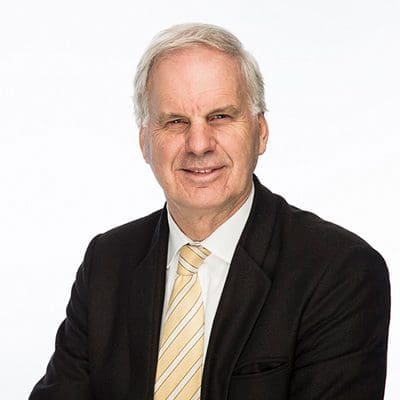
Professor Anthony L Cunningham AO FAHMS
The Westmead Institute for Medical Research
Professor Tony Cunningham AO is Executive Director, The Westmead Institute for Medical Research and Director of the Institute’s Centre for Virus Research, Professor of Research Medicine Sydney Medical School, Westmead, the University of Sydney. He is also Director of the Australian Centre for HIV and Hepatitis Virology Research (ACH2), funded directly by the Australian Government. He is a clinician scientist who trained in infectious diseases, clinical virology and virology research at the University of Melbourne and as a postdoctoral fellow in infectious diseases at Stanford University. His major research interests are in HIV and Herpesviruses biology and immunology, especially in relation to the development of vaccines and microbicides. He has published more than 400 papers on these topics, with ~21,000 citations. He has played a leading role in elucidating HIV interactions with macrophages, as reservoirs, and with dendritic cells as an initial target cell in the anogenital mucosa, over 30 years; recently focusing on viral immune-evasive mechanisms. His group has also made numerous key contributions to human HSV immunology and T-cell adjuvants, which has led to the development and trialing of novel HSV and Herpes Zoster vaccines by GlaxoSmithKline. The latter is now bussed in North America. In 2010, Tony was made an Officer in the Order of Australia (AO) for “service to medicine, particularly in the field of viral research and through the development and leadership of medical and biomedical research” and, in 2015, he was elected a fellow of the Australian Academy of Health and Medical Sciences (FAHMS). He is an Immediate Past President of The Association of Australian Medical Research Institutes (2017-18).
Chair, QLD State Branch
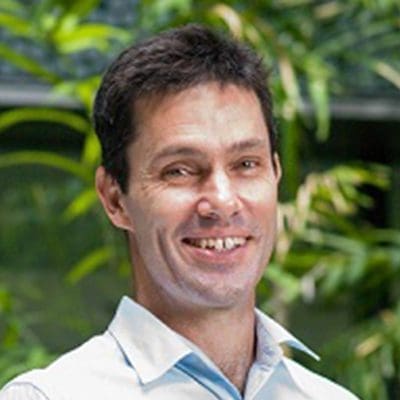
Professor David Whiteman AM FAHMS
QIMR Berghofer
Professor David Whiteman is a medical epidemiologist with a special interest in the causes, control and prevention of cancer. He received his medical degree from the University of Queensland in 1991, and his PhD in cancer epidemiology in 1997. Professor Whiteman has an international reputation for research into melanoma and skin cancer, and the public health aspects of cancer control. He has more than 350 peer-reviewed research publications, an H-index of 72 and has been awarded more than $50 million in competitive research grants as Chief Investigator. In addition to his research activities, he is Deputy Director of QIMR Berghofer, a Fellow of the Australian Academy of Health and Medical Sciences, a Fellow of the Australasian Faculty of Public Health Medicine, and Honorary Fellow of the Skin Cancer College of Australasia. In 2019, he was made a Member of the Order of Australia for his services to cancer epidemiology.
Chair, SA & NT State Branch

Professor Helen Marshall AM FAHMS
The University of Adelaide
Professor Helen Marshall AM is a clinician researcher and NHMRC Practitioner Fellow with specialist training in child health, public health and vaccinology. She is a Consultant and Professor in Vaccinology at the Adelaide Medical School and the inaugural Clinical Research Director, Women’s and Children’s Health Network. She is a Child and Adolescent Health theme leader and Deputy Director of the Robinson Research Institute at The University of Adelaide, South Australia. She is the Medical Director of the Vaccinology and Immunology Research Trials Unit, VIRTU, at the Women’s and Children’s Hospital, and Research Leader, Vaccines and Infectious Diseases Group in the Robinson Research Institute. She has previously been a member of the ATAGI, which advises the Federal Minister of Health on immunisation for the National Immunisation Program and currently undergoes vaccine evaluations for the ATAGI.
Professor Marshall has published over 230 peer-reviewed papers in international journals and received > $35 million in grant funding. She was awarded the NHMRC “10 of the Best” research projects in 2016, the SA Science Award for Excellence in Research for the Public Good in 2011, the SA Science Award for Excellence in Research Collaboration in 2019 and a Member of the Order of Australia in 2022. She is a Fellow of the Academy of Health and Medical Sciences, the 2022 SA Australian of the Year, SA Woman of the Year, and Office of the Commissioner for Public Sector Employment Leader of the Year.
Chair, VIC & TAS State Branch
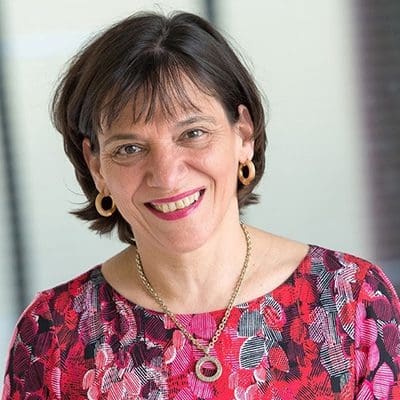
Professor Flavia Cicuttini AM FAHMS
The Alfred, Monash University
Professor Flavia Cicuttini MBBS, FRACP, PhD, MSc, FAFPHM, is a rheumatologist and epidemiologist. She is the Alfred Hospital Head of Rheumatology, Head of the Musculoskeletal Unit at Monash University, and an NHMRC Investigator Leadership Fellow. Her principal research interests are the prevention and treatment of musculoskeletal diseases. Her awards include the Australian Rheumatology Association Parr prize (2010) and the President’s award (2015), Telstra Business Women’s Awards Finalist (2012), and Altmetric top 100 globally award (2019). She has published over 570 peer reviewed papers, cited more than 41090 times. She currently serves on the AIHW National Arthritis and Musculoskeletal Monitoring Advisory Group, the Repatriation Medical Authority, the Board of the Osteoarthritis Research Society International 2019-, and on the editorial board of a number of journals.
Chair, WA State Branch

Professor Asha Bowen OAM FAHMS
Perth Children’s Hospital and The Kids Research Institute Australia
Professor Asha Bowen is a clinician-researcher and is working across the Perth Children’s Hospital as a paediatric infectious disease specialist and heads the Healthy Skin and ARF Prevention team at The Kids Research Institute Australia (formerly Telethon Kids Institute). Prof Bowen holds affiliation with several Universities including the Division of Paediatrics, School of Medicine at the University of Western Australia, Honorary Fellow at Menzies School of Health Research, Charles Darwin University, Adjunct Research Fellow at the Institute for Health Research, The University of Notre Dame Australia and Honorary Senior Lecturer at the University of Cape Town. This uniquely positions her for rapid translation of research results from bush to bench to bedside and beyond, with impact globally. Since 2010, Prof Bowen has held continuous people support NHMRC Fellowships including PhD (2010-14) [awarded by Charles Darwin University in 2015], Early Career Fellowship (2015-20), Emerging Leader Investigator (EL2) (2020-24) and Leadership 1 Investigator Award (L1) (2025-29). Since PhD completion, she has achieved >$100M in grant funding for over 90 research projects and published >230 peer-reviewed manuscripts as lead or senior author on >50% of these publications.
Prof Bowen has generated breakthrough new knowledge and health impacts in skin infection control for Aboriginal Australians. CI Bowen’s research focusses on reducing the burden of infectious diseases that lead to RHD, with studies spanning from bush (remote clinical trials: SToP Trial 2017-24, Missing Piece 2018-24), to bench (lab experiments on skin and throat pathogens, AMR experiments), to bedside (S. aureus bacteraemia trials to improve outcomes) and beyond (National Healthy Skin Guidelines, 2nd edition 2023).
In 2023 she became the first ever female President of the World Society for Pediatric Infectious Diseases and was recognised for her outstanding research by Cosmos Magazines – 50 Women on the cutting-edge of science list. In 2024, she received the Order of Australia Medal (OAM) for services to infectious diseases.
Other Council members
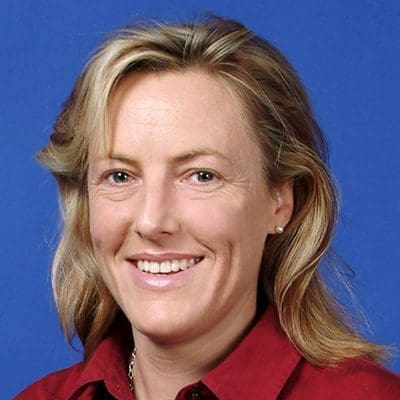
Professor Gabrielle Belz FAHMS
The University of Queensland
Professor Gabrielle Belz trained in veterinary medicine and surgery from the University of Queensland in 1993 and has made major contributions to the field of immunology for which she received a DVSc. Her prime research interests are in the areas of infectious disease, particularly lung and gut diseases, where she works to unravel how protective innate and adaptive immune cells are wired to generate long-live protective memory. She has published over 200 peer-reviewed original papers in leading scientific journals, an H-index of 75, and has been cited > 21,000 times. She is currently the Chair of Immunology, University of Queensland Diamantina Institute.
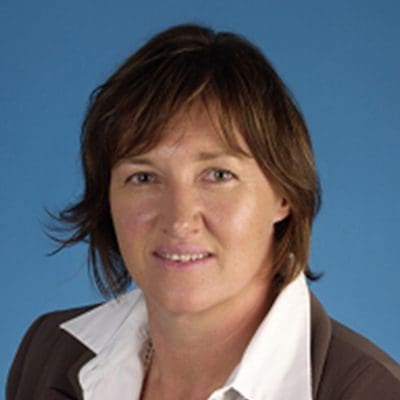
Distinguished Professor Elizabeth Elliott AM FAHMS
Children's Hospital Westmead Clinical School, University of Sydney
Elizabeth Elliott is a Distinguished Professor in Paediatrics and Child Health at the University of Sydney; an NHMRC Practitioner Fellow; and Co-Director of the NHMRC Centre of Research Excellence in FASD. She’s a Consultant Paediatrician at the Children’s Hospital at Westmead, where she leads the NSW Fetal Alcohol Spectrum Disorder (FASD) assessment service and is Co-Director of the centre for Care and Intervention for Children and Adolescents affected by Drugs and Alcohol (CICADA).
Professor Elliott has a Doctorate in Medicine (Oral Rehydration therapy) and an MPhil in Public Health (Haemolytic Uraemic Syndrome). She’s a Fellow of the Royal Australasian College of Physicians, Royal College of Paediatrics and Child Health (UK), and Royal College of Physicians, London.
Leadership roles have included Head of the International Network of Paediatric Surveillance Units; Founder/Director of the Australian Paediatric Surveillance Unit for study of rare childhood diseases; co-founder of the Paediatric Active Enhanced Disease Surveillance system; and Chair of the 2013 International Pediatric Association conference.
She consulted to the Australian Human Rights Commission in the Inquiry into Children in Immigration Detention; to WHO regarding alcohol policy for pregnancy; and to National Institute of Alcoholism and Alcohol Abuse regarding FASD. Board Memberships include Royal Far West, the National Organisation for FASD, and the Hoc Mai Foundation. She sits on the Australian Government’s National FASD Advisory Committee and Life Saving Drugs Program Expert Committee.
Recognition includes Membership of the Order Australia, Fellowship of the Royal Society of NSW (RSN), the James Cook Medal (RSN), AMA Excellence in Healthcare Award, Howard Williams Medal (RACP), and Asian Pacific Paediatric Association Outstanding Paediatrician Award. She will focus on promoting diversity within the AHMS Fellowship and ensuring that the AAHMS is relevant, proactive and recognized as the pre-eminent voice for health and medical science in Australia.
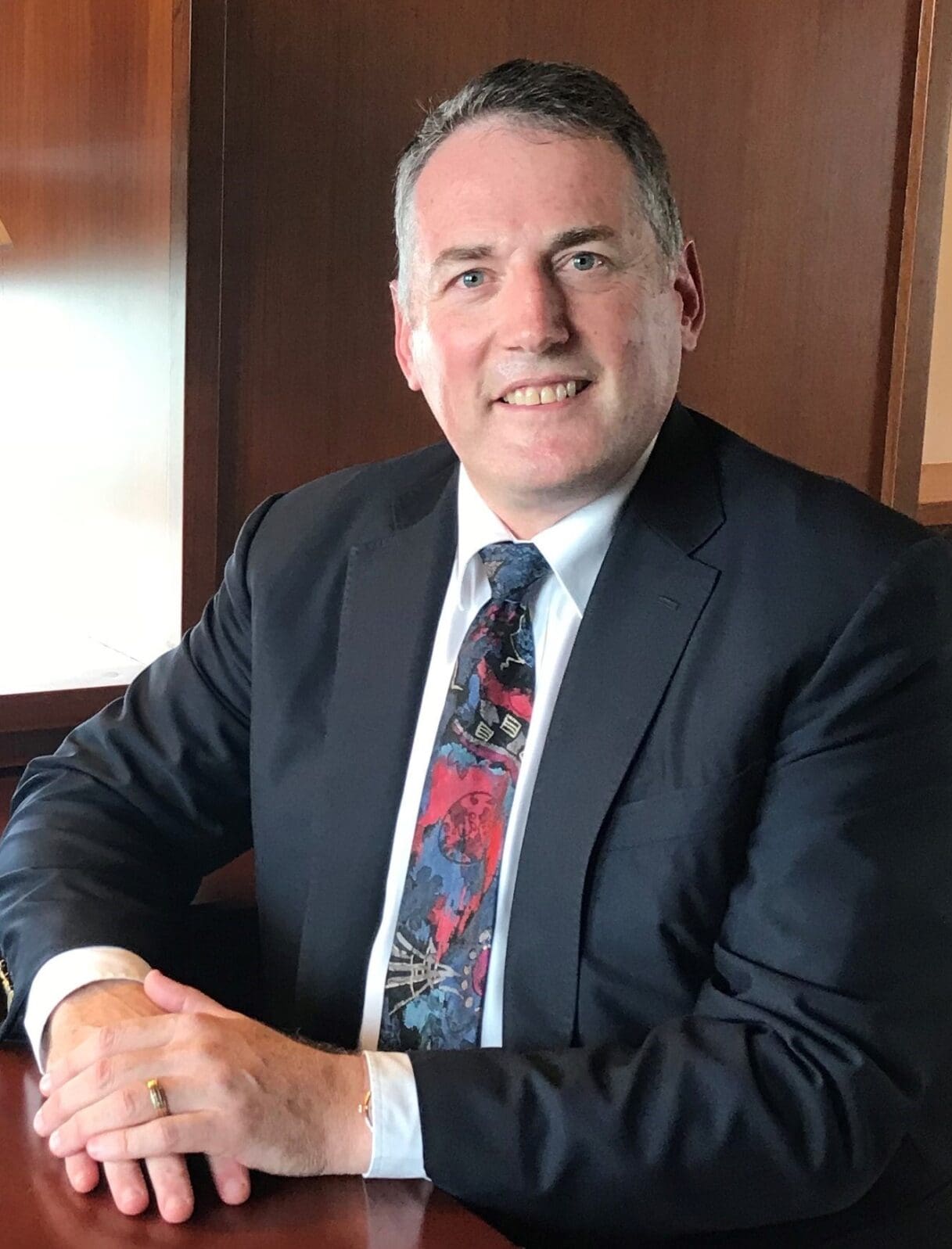
Professor Russell Gruen FAHMS
Dean, College of Health and Medicine, The Australian National University
Professor Russell Gruen is Dean of the ANU College of Health and Medicine and a surgeon at The Canberra Hospital. Previously he was Professor of Surgery and Public Health at Monash University and Director of the National Trauma Research Institute, after which he led health technologies and international partnerships at Nanyang Technological University Singapore.
He has made substantial contributions to care for the severely injured, and strengthened research infrastructure with a national trauma registry, a prehospital clinical trials network, and novel evidence-based medicine capabilities. He is recognised for influential work on professional ethics, and interdisciplinary research with strong emphasis patient benefit.
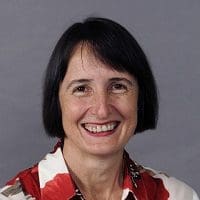
Professor Maree Teesson AC FAHMS FASSA
Centre Director, The Matilda Centre
Distinguished Professor Maree Teesson AC is Director of the Matilda Centre and an NHMRC Leadership Fellow at the University of Sydney. Professor Teesson is Chair of Australia’s Mental Health Think Tank. Professor Teesson is a Former National Mental Health Commissioner (2018-2021), an Australian Academy of Health and Medical Sciences Fellow, a Fellow of the Australian Academy of Social Sciences, and a Fellow of the Royal Society of New South Wales. Professor Teesson was announced as a Companion of the Order of Australia in the Australia Day 2018 Honours List, awarded a Westpac/Australian Financial Review 100 Women of Influence (Innovation), and awarded an Australian Museum Eureka Prize for Outstanding Mentor of Young Researchers. Professor Teesson has made a major contribution to Australia’s health and medical research effort in the field of mental health and substance use. In particular, she is known nationally and internationally for her research on the comorbidity between mental health and substance use disorders.

Professor Helena Teede AM FAHMS
Executive Director, Monash Partners Academic Health Sciences Centre, Director, Monash Centre For Health Research And Implementation
Professor Teede is a clinician, academic, and leader committed to research and translation, delivering measurable changes in policy and practice. She is nationally and internationally recognised for excellence in health and medical research, exceptional leadership, and community engagement. Focusing on improving women’s reproductive health, she has spearheaded the development of the first evidence-based guidelines on PCOS in the world, pioneered interventions for preventing obesity in women, and established one of only four national Diabetes Centres of Excellence. Having raised a family and maintained an active academic and clinical career, she is a role model for women in her profession.
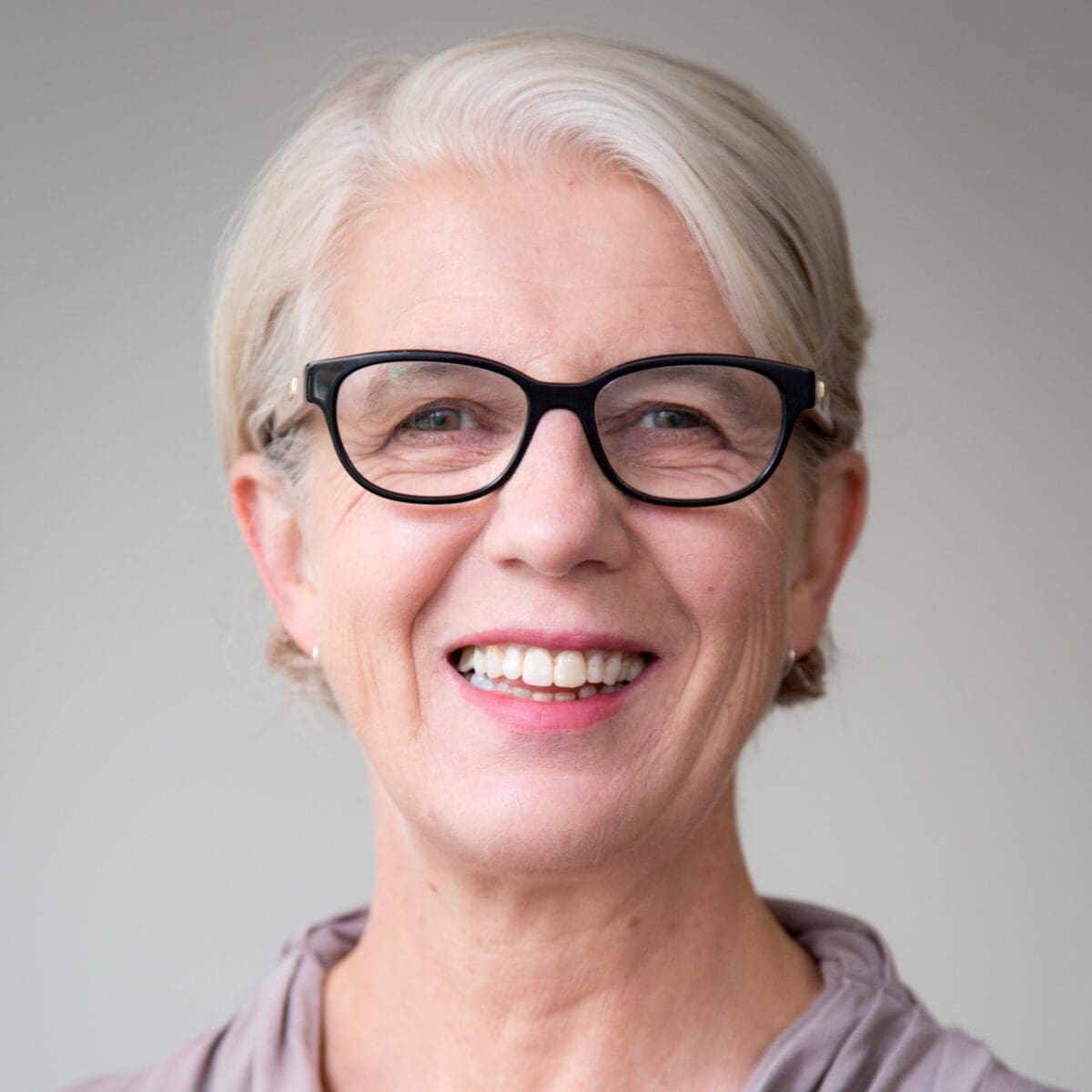
Distinguished Professor Dianne Nicol FAHMS
The University of Tasmania
In 2021, Professor Dianne Nicol stood down from her positions as Distinguished Professor of Law and Director of the Centre for Law and Genetics (CLG) at the University of Tasmania in Australia, but continues as Distinguished Professor Emerita. Dianne has a background in science as well as law, with a PhD in cell biology. She was elected as a fellow of the Australian Academy of Law in 2016 and the Australian Academy of Health and Medical Sciences in 2020.
The broad theme of the CLG’s research is the regulation and governance of biomedicine, human genetics and genomics, and stem cell technology. The CLG team was established more than 25 years ago and has broad range of international collaborators. Professor Nicol’s current research focuses primarily on the regulation and governance of personalized medicine, genomic data sharing, biobanking, genome editing and other emerging health technologies, together with commercialisation of biotechnology and patenting of biotechnological inventions.
Professor Nicol is Chair of the National Health and Medical Research Council Embryo Research Licensing Committee and co-lead of the Regulatory and Ethics Workstream of the Global Alliance for Genomics and Health.
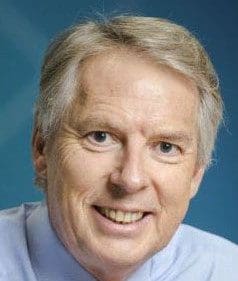
Professor Don Nutbeam FAHMS
Executive Director, Sydney Health Partners and Professor of Public Health, School of Public Health, University of Sydney
Professor Nutbeam is the Executive Director of Sydney Health Partners and a Professor of Public Health at the University of Sydney. Sydney Health Partners is a NHMRC accredited Research Translation Centre. Professor Nutbeam’s career has spanned senior leadership positions in universities, government, and health services. He has also made sustained contributions to international organisations including WHO and the World Bank. He was formerly Vice-Chancellor of the University of Southampton, UK, Provost of the University of Sydney, and Head of Public Health for the UK Government. He is a public health scientist with research interests in the social and behavioural determinants of health, and in the development and evaluation of public health interventions. His current research focusses on the development and testing of interventions to improve health literacy in different populations.
Patron of the Academy and Honorary Fellow
Professor Emeritus Sir Gustav (Gus) Nossal AC FRS FAA FAHMS
The University of Melbourne
Patron Letter
I’m delighted to have helped with the creation of an Australian Academy of Health and Medical Sciences, from concept to reality. I was honoured and thrilled to be invited to become the Academy’s inaugural Patron.
Learned academies, from the time of founding of the Royal Society of London, have been an essential element of scientific endeavour. They provide a national and international forum for debate and discussion amongst thinkers and researchers. I am sure that this new academy will fulfil this important role for health and medical research in Australia.
Australia has a notable record of achievement in research over the years, particularly in the biological sciences, in medicine and in health research, and Australia’s current expertise is reflected in the initial fellowship of the Academy. Together, the Fellows form an expert resource which will provide great value to the Australian community and to the world, now and into the future.
The Academy’s proposed mentorship program, for research-orientated health professionals and health focused research scientists, will help to ensure that Australia continues to contribute to world health through research, and will provide training for future Fellows of the Academy.
To be elected to this new Academy should be an aspiration of every high-achieving Australian health and medical scientist.
I look forward to supporting the future activities of the Academy, as its Patron.
G J V Nossal
December 2014

